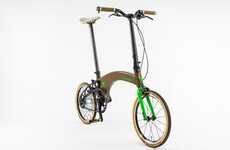
Bruce Dietzen Has Created an Environmentally Friendly Car Made from Hemp
Mishal Omar — May 11, 2016 — Eco
Inspired by Henry Ford, this cannabis car was created by Bruce Dietzen in Florida. To make the car Dietzen was forced to import cannabis hemp from China because hemp remains illegal to grow in the state of Florida.
Made from the body of a Mazda, the cannabis car is supposed to be "leading the charge in making carbon-neutral vehicles," an impressive feat for its creator who took on this project on their own. The car is made from woven hemp, which makes it lighter than cars made from fiberglass and is also 10 times more dent-resistant than steel.
The vehicle runs on bio fuel made from "recycled agricultural waste" and has an even lower carbon footprint than electric-powered cars.
Made from the body of a Mazda, the cannabis car is supposed to be "leading the charge in making carbon-neutral vehicles," an impressive feat for its creator who took on this project on their own. The car is made from woven hemp, which makes it lighter than cars made from fiberglass and is also 10 times more dent-resistant than steel.
The vehicle runs on bio fuel made from "recycled agricultural waste" and has an even lower carbon footprint than electric-powered cars.
Trend Themes
1. Sustainable Vehicle Manufacturing - Creating vehicles using eco-friendly materials and alternative fuels, such as those made from hemp and recycled agricultural waste, presents disruptive innovation opportunities in the automotive industry.
2. Bio-based Materials - Utilizing natural fibers like hemp in product manufacturing, like constructing cars, offers disruptive innovation opportunities across multiple industries, including automotive, construction, and fashion.
3. Carbon-neutral Transportation - Developing carbon-neutral vehicles, such as the cannabis car made from hemp, presents disruptive innovation opportunities to reduce the environmental impact of transportation.
Industry Implications
1. Automotive - The automotive industry can explore disruptive innovation opportunities by incorporating eco-friendly materials and alternative fuels, like hemp and bio fuel, into vehicle manufacturing.
2. Construction - The construction industry can benefit from disruptive innovation opportunities by adopting bio-based materials like hemp in building structures, promoting sustainability and reducing carbon emissions.
3. Fashion - The fashion industry can explore disruptive innovation opportunities by incorporating bio-based materials, such as hemp, in the production of sustainable and eco-friendly clothing and accessories.
4.6
Score
Popularity
Activity
Freshness























